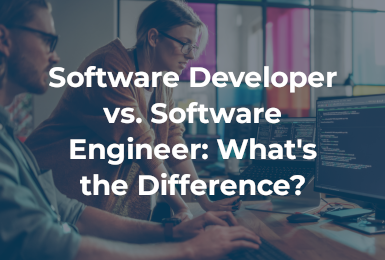If you're fascinated by the design and development of software systems and applications, and if you enjoy creative problem-solving and collaboration, then a career as a software developer could be right for you. Not only are software developers in high demand across the United States (with a projected 17 percent increase in job outlook between 2023 and 2033), but these professionals also tend to enjoy a flexible, creative, and stimulating work environment.
As part of their job, software developers need to know a variety of programming languages that are used widely in the industry. So, what is the best programming language to learn in this field and adjacent industries? There's really no one-size-fits-all answer, as this will depend on your specific career goals and what your work entails.
What Is a Programming Language?
Specifically, a programming language refers to a series of instructions that tell a computer or system to carry out a particular task. Much like a "traditional" language (like English or French), each programming language has its own unique rules and syntax.
In software development and similar professionals, programming languages can be used to create functioning applications, digital systems, websites, and video games.
Types of Programming Languages
Within the overarching realm of software development languages and programming languages, there are also several types or subsets.
Procedural Programming Languages
A procedural programming language is one that is designed to execute commands in sequential order, meaning it will perform actions in the exact order instructed in the code itself. With a procedural programming language, codes are divided into smaller blocks (known as functions or procedures) and followed sequentially or in a top-down manner.
Some examples of procedural programming languages include C and Python.
Functional Programming Languages
Functional programming languages, on the other hand, rely on functions to create a hierarchy, meaning that commands are not always followed exactly in sequential order. Meanwhile, functional programming languages rely largely on mathematical functions and referential transparency to ensure accuracy.
Rust is one example of a functional programming language that is often used in web development and game development.
Object-Oriented Programming Languages
Object-oriented programming (OOP) languages organize their code around self-contained units of data and methods. This structure allows the code to be reused as needed to create new objects and classes that can inherit properties from existing code.
PHP and JavaScript are two examples of object-oriented programming languages, though Python and Java have some components of this language type as well.
Scripting Languages
Another common type of programming language is the scripting language, with examples including SQL and Ruby. These languages are unique in the sense that instructions are executed one line at a time, rather than being compiled and executed all at once. Among the most simplistic types of programming languages, scripting languages are ideal for beginners to learn, and they are versatile enough to be used for a wide range of purposes and applications.
Logic Programming Languages
Unlike many other programming languages, which follow steps and sequences to carry out commands, logic programming languages rely on logical reasoning to solve problems and carry out functions. The most important part of any logic programming language is the inference engine, which formulates answers and actions by automatically searching through established rules and truths.
Imperative Programming
Finally, imperative programming languages rely on complex algorithms to carry out actions and functions. Using imperative code, systems can carry out step-by-step actions using control structures and existing data. These types of languages are ideal in situations where programmers and developers need direct control, such as system programming and creating performance-critical applications.
Many popular programming languages have some imperative components, including C++ and Java.
Best Programming Languages to Learn
So, what are some of the best programming languages to learn in today's software development realm? While this is by no means a comprehensive list of every relevant programming language, it is a good place to start.
JavaScript
A programming language that runs in web browsers and is used to make websites and individual web pages both interactive and functional.
Python
Another popular programming language, Python is mostly used in web development and software development to build websites and automate tasks. It can also be extremely useful in testing and troubleshooting software.
Java
This programming language, which falls into the object-oriented category, is most often used in the design and development of websites and applications. While it is based on C and C++, it is its own language and is commonly used to create mobile apps, back-end applications, and even AI chatbots.
PHP
PHP, which stands for Hypertext Preprocessor, is a scripting language used to create web pages and web apps. When users try to access a web page, the web server runs the PHP code and automatically generates it as HTML. From there, the user's browser can access and interact with the page.
Kotlin
While some programming languages, like PHP and JavaScript, have been around for decades, Kotlin is a more modern language most often used in app development (especially for Android devices). This language is also somewhat unique in its open-source nature, which means that it's community-based and free to use.
SQL
Structured query language (SQL) is a programming language for accessing and manipulating databases. Most often used to store, manage, and retrieve data, SQL remains one of the most widely used programming languages today.
C#
When it comes to the creation of desktop applications, mobile applications, and web applications, C# is a valuable language to know. This object-oriented language has many potential uses and is relatively easy to learn, especially for those who already have some experience with Java or JavaScript.
Ruby
Another object-oriented programming language that's gaining popularity is Ruby, a versatile language that can run on just about any operating system. This language is also open-source, so it can be accessed and used by anybody for free.
C and C++
While C and C++ are technically two distinct programming languages, they are often lumped together because they are both compiled languages based on one another. The biggest difference between C and C++ is that C is a procedural programming language, meaning that it doesn't support objects or classes. Besides that, much of the syntax and rules used are the same.
HTML
Hypertext markup language, or HTML, has been used for decades in web development. This language relies on markup or special coding to tell web browsers how a web page's content should be displayed. This is a critical language to know if you plan on going into web design or development.
CSS
CSS, which stands for cascading style sheets, is another popular language used in web design and development. Specifically, CSS is used to style, and lay out the content of a web page in a way that can be interpreted by any web browser. While similar to HTML, CSS differs in the sense that CSS delivers more of the visual design, whereas HTML is more focused on structure.
Scala
This modern programming language is similar to Python in the sense that they are both object-oriented languages. However, Scala is more often used for data processing, web development, and advanced programming projects.
Swift
Swift is a programming language that was specifically designed and built by Apple, and is used to build applications and programs for Apple devices. Since its release, however, its capabilities have expanded to be used on Linux and Windows systems as well.
Go
Also known as Golang, Go is a programming language that was built by Google and is often used to build large software systems that will need to grow and scale over time.
Rust
Last but not least, Rust is a programming language that is often used in systems programming. With its focus on security and safety, Rust is relatively easy to learn and known for its reliability.
Learn Programming Languages for Your Career Path
In addition to software development, there's a lot you can do when you're proficient in the use of different programming languages. Not sure which programming languages to focus on learning first? Here are a few options to consider based on your career goals.
Front-End Development
Front-end software developers are responsible for creating the components of websites, programs, and applications that the end user sees and interacts with.
These professionals rely on an extensive knowledge of programming and coding to achieve their goals. Most often, front-end developers work with JavaScript, so this is one language to consider mastering early in your learning journey,
Back-End Development
On the opposite end are the back-end developers, who are instead responsible for the server side of programs, applications, and websites. This is part of the system that users don't see or interact with but that plays such a critical role in the overall function and reliability of the system.
If you're interested in working behind the scenes in back-end development, consider learning such programming languages as Java, Python, and Go.
Mobile App Development
Working in mobile app development allows us to take a hands-on role in the creation and maintenance of applications used on smartphones and tablets. This line of work involves not just the design and development of these apps, but providing ongoing testing, support, troubleshooting, and integration.
Mobile app developers rely on a wide range of programming languages to do their jobs, but among the most common are Swift and Kotlin.
Game Development
Interested in being part of the video game world? If so, then a career in game development may be right for you. In this type of role, you'll be responsible for using your coding knowledge to turn video game ideas and concepts into functioning realities on the screen. Meanwhile, you'll work alongside other professionals (including artists and designers) to achieve shared goals.
If you want to get into game development, the most important programming languages to learn include C# and C++.
Making the Right Choice for Your Programming Journey
With so many different programming languages out there, choosing the right one(s) to learn for your career goals may seem like a daunting task. After all, these aren't languages you'll be able to learn overnight; instead, you'll need to dedicate a fair amount of time and practice to master them.
Ultimately, the best way to determine which programming languages will be most relevant to your career goals is to consider exactly where you see yourself in the next few years. Are you interested in a general software development role, or do you see yourself in a more tailored role (such as in app development or game development)?
Consider, too, that some programming languages are more versatile than others. Both Python and C++ can be used across a variety of applications, ranging from web development and artificial intelligence to automation and game development.
Interested in a Software Development Degree?
Programming languages can be used to create web applications, mobile applications, software applications, and just about anything else you can imagine. By learning the programming languages that are most relevant to your interests and professional goals, you can set yourself up for greater success in your own work.
If you're serious about getting into software development language and have not yet pursued a formal education, now is the time to explore our Software Development associate degree program at Champlain College Online. Designed to be completed in as little as seven terms, this 60-credit-hour program covers the technical skills and core competencies needed to explore roles in software development, software design, computer programming, and artificial intelligence. Plus, the online component means this program offers unrivaled flexibility with students' busy schedules.
Learn more about our software development degree program by reaching out today, or get the ball rolling by filling out your online application for admission.






